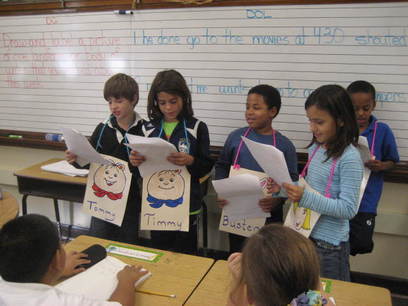Definition:Reader's theater is a strategy for developing reading fluency. It involves children in oral reading through reading parts in scripts. In using this strategy, students do not need to memorize their part; they need only to reread it several times, thus developing their fluency skills. The best reader's theater scripts include lots of dialogue (Reading Rockets, 2015).
This picture above shows one example of what a readers theatre performance may look like. It can be informal at first but the students can practice numerous times to reach a "final performance" to act read or act out to the class. Using pictures of the characters like they did above can make it a little more realistic and fun for the kids performing and watching/listening.
Reader's Theatre Examples for Content Areas(Education World, 2006) (Swallow, 2010).
Differentiated Instruction
|
Reasons to use Reader's Theatre:
Steps to Reader's Theatre:
In the video above a third grade class performs a Reader's Theatre skit. They have read this many times before recording this performance and have practiced to make it their best. You can tell their teacher has taught them to use actions, props, and to change their voices to fit with the character. Reader'sTheatre doesn't have to be done this way with a performance at the end. Though it is fun for the kids to have the opportunity to give it their best by reading fluently and clearly as if they were performing in front of a real audience.
|
References:
Reader's Theater Script: A Mystery Message. (2006, January 13). Retrieved October 23, 2015, from http://www.educationworld.com/a_curr/reading/ReadersTheater/ReadersTheater006.shtml
Reader's Theater. (2015). Retrieved October 23, 2015, from http://www.readingrockets.org/strategies/readers_theater
Stone Library Events. (2015). [Image]. Retrieved October 23, 2015, from https://stoneacademy.wikispaces.com/Stone Library Events
Swallow, R. (2010). Timeless Teacher Stuff. Retrieved October 23, 2015, from http://www.timelessteacherstuff.com
Reader's Theater Script: A Mystery Message. (2006, January 13). Retrieved October 23, 2015, from http://www.educationworld.com/a_curr/reading/ReadersTheater/ReadersTheater006.shtml
Reader's Theater. (2015). Retrieved October 23, 2015, from http://www.readingrockets.org/strategies/readers_theater
Stone Library Events. (2015). [Image]. Retrieved October 23, 2015, from https://stoneacademy.wikispaces.com/Stone Library Events
Swallow, R. (2010). Timeless Teacher Stuff. Retrieved October 23, 2015, from http://www.timelessteacherstuff.com
Differentiated Instruction
- Use easier scripts with fewer words for younger or struggling readers.
- Write the script (or the student's part of the script) with print that is easy to read i.e. larger or in preferred font. Supply Braille scripts when needed.
- Give the student their part in advance. Encourage them to practice at home with their parents
- Have students read parts together.
- Allow advanced students to write parts of the script.
- When assigning roles, be sensitive to students' individual needs. Assign roles accordingly; provide extra, individual practice if needed.

